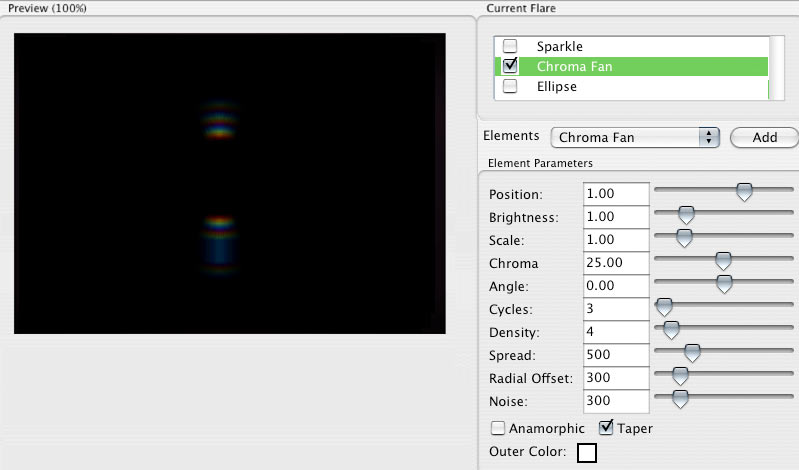
Element: Chroma Fan
Chroma Fan generates rainbow diffraction patterns. These rainbow patterns are similar to the Chroma Hoop element, but they are applied on both sides of the light source. Chroma Fan does not render on just one side of the light source.

What it is based on
These rainbow diffractions often appear when a net is used for diffusion over the camera lens, or when there is fog or mist in the air.
Position
Sets the location of the Chroma Fan element. The position is always along a line that passes through both the center of the image and the light source. Alternately, you can click inside the Preview Window and reposition the element with the cursor crosshair.
A value of 1 sets the element at a light source. A value of 0 sets the element in the center of the composition frame. A value of -1 sets the element on the opposite side of the frame from the light source.
Brightness
Sets the brightness of the Chroma Fan. High values make the element brighter. Low values make the element less bright and more transparent.
Scale
Together, Scale and Radial Offset set the radius for the fan pattern.
Consider Scale as the Big Scale. Scale tends to result in big jumps of size. High values makes the two halves of the rainbow pattern larger while also moving them further apart. Low values make the rainbow pattern halves smaller and closer together.
Radial Offset
Radial Offset acts as Fine Tuning for the pattern scale, making it easy to get the precise size you are looking for. High values makes the two halves of the rainbow pattern larger while also moving them further apart. Low values make the rainbow pattern halves smaller and closer together.
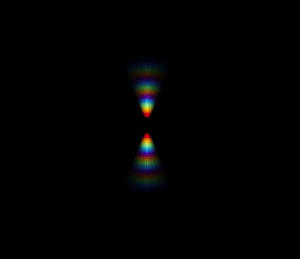
![]()
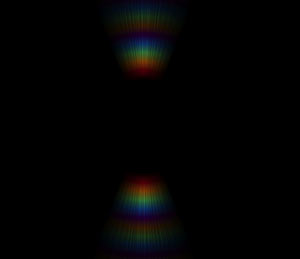
At left, Scale and Radial Offset set low. At left, Scale and Radial Offset set high.
Chroma
How vibrant or saturated the colors are. At low values, the fan will be shades of gray and have no color. High values, especially along with high Brightness, will produce very vibrant, saturated colors.
Angle
Sets the angle of the Chroma Fan by rotating it. Essentially, Angle decides where the points of the ribs sit. High values rotate to the right. Low values rotate to the left.
Cycles
Sets how many times you want the spectrum (or rainbow) to loop. Imagine a double rainbow and you’ll get the idea. High values create more loops, which looks like additional ribs in the fan.
Density
The Fan is made up of many rays of color. Density sets how many rays are there and therefore how solid the Fan appears. At low values, the Fan will appear to be more faded and transparent because there are fewer rays creating it. High values create more rays and a more solid looking fan.
TIP: After you have rendered KLF Photo, add Photoshop’s Surface Blur filter to blur the rays together and create a big, soft fan of color. This only works with high Density values.
Spread
Sets how wide the Fan rays are. You can go anywhere from a small sliver to a full circle. Low values set a more narrow fan. High values set a wider fan. TIP: To get a full circle, manually set Spread to 3000.
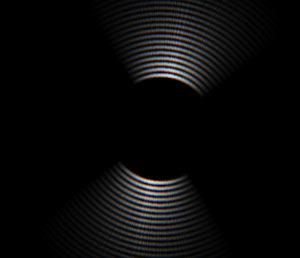
![]()
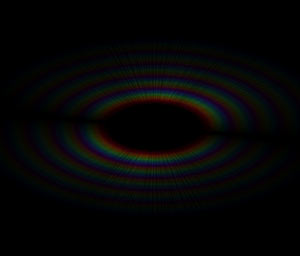
At left, Brightness set high, Scale set medium, Chroma set low, Cycles at 20, Density set medium, Spread set medium, Anamorphic off.
At right, Brightness set low, Scale set low, Chroma set high, Cycles at 5, Density set high, Spread set high, Anamorphic on.
Noise
Nose sets the space between the rays. The higher the Noise value, the more uneven the space between rays will be. At low values, the rays have a consistent amount of space between them, making the Fan look solid (and making it easier to blur the rays together). High values cause striations in the Fan, creating large gaps between some rays or sections. Sort of like a cracked Fan.
Anamorphic checkbox
Use this to create a wide elliptical element or a circular elliptical element. Turned off by default. When the checkbox is checkmarked, the Chroma Fan is elliptical. This simulates a common aspect of using anamorphic lenses in cinematography in which light reflections in the lens appear elliptical. When the checkbox is off, the element is round, since light reflections appear round in spherical cinematography.
Taper checkbox
Turned on by default. When this is checkmarked, the Fan ribs fade at their edges. When this is off, the Fan is equally solid in all spots.
Outer Color
Sets the base color of the spectrum. The default is white. Choosing another color tints the rainbow.